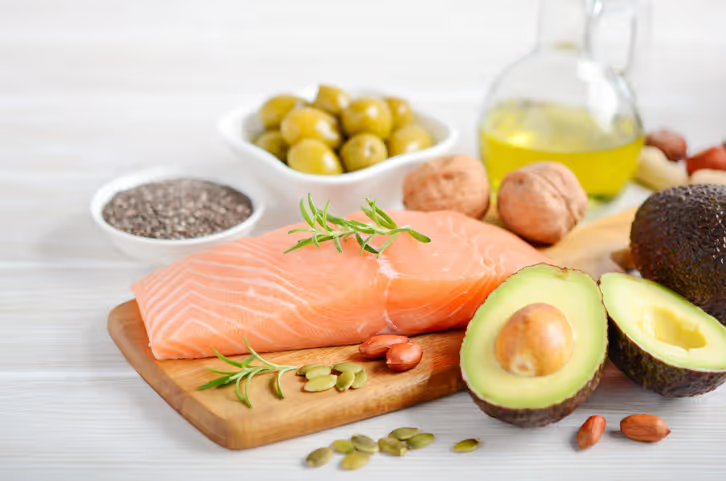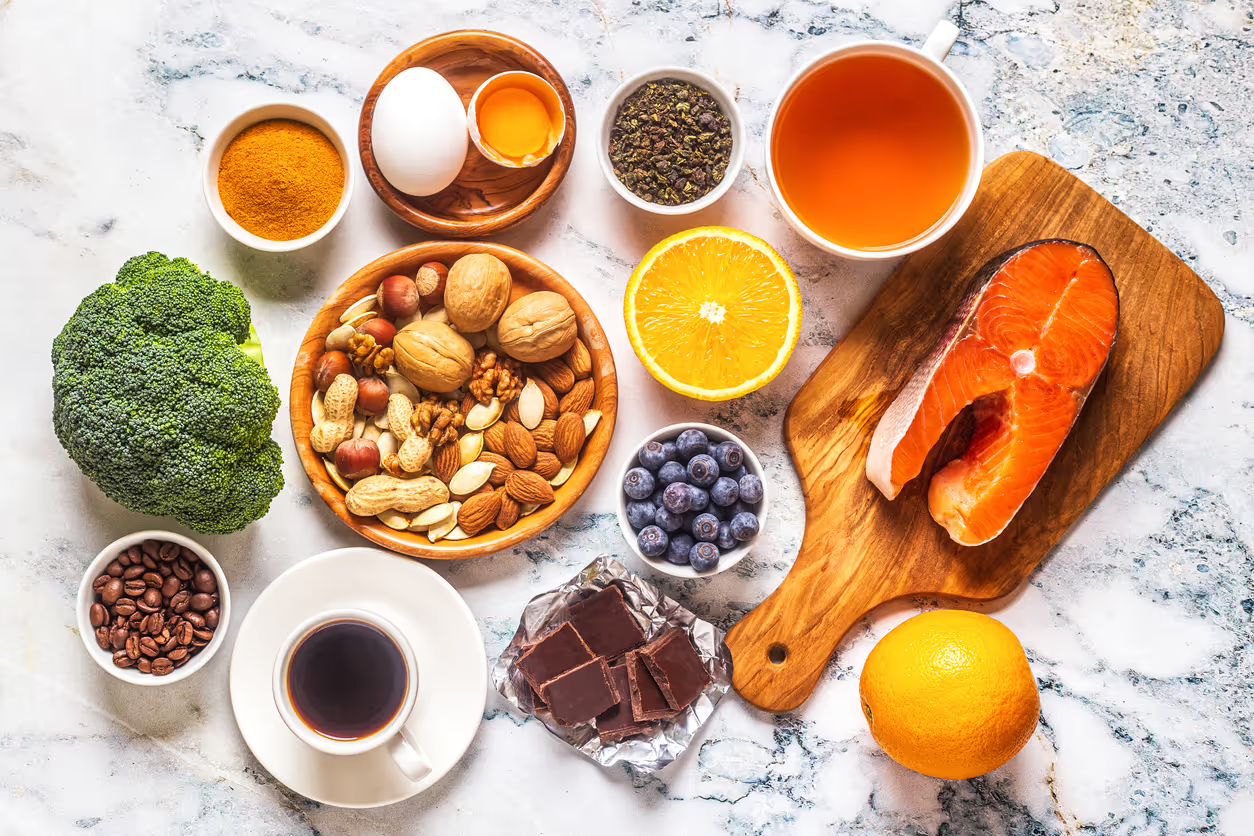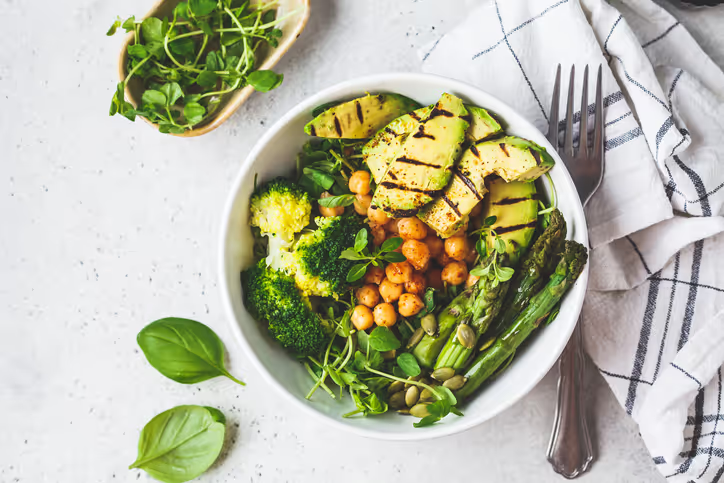Can I eat fat and still lose weight? You’re not the first to wonder if it's possible. If you’re trying to lose weight , you may feel it's necessary to remove fats from your meals and snacks to support a healthy diet. But we’d urge you to consider a few things first. Fats are a must-have nutrient to warm your body, supply energy, support your cells, and protect your organs; so while it may feel right to cut them out, your body would greatly be missing out. While you may feel like fats are the bad guys, focusing on eating good fats for weight loss is beneficial. You can eat fat and lose weight by choosing these seven healthy fats for weight loss.
What are dietary fats?
You may have heard of different types of fats, like saturated fats and monounsaturated fats. Here’s a breakdown of the four kinds of fat to be familiar with:
- Saturated fats: Commonly known for being solid at room temperature, saturated fats naturally occur in many animal foods, such as meat and dairy, and tropical plant fats, like coconut and palm. According to scientific evidence, the American Heart Association says that excess saturated fats in your diet can increase your risk of heart disease because they raise bad blood cholesterol levels, or low-density lipoprotein (LDL) cholesterol. Lipoproteins serve as vehicles that make it possible for fats to travel through the blood to get to the cells. LDL is a lipoprotein that’s made of both fat and protein, and with it being low-density, it has higher fat content and lower protein content.
- Trans fats: These fats can be artificially created while processing packaged foods or found in small amounts in animal products. Trans fats increase your bad cholesterol levels (LDL) and lower your good cholesterol levels, or high-density (HDL) lipoprotein. HDL is also made of fat and protein, but it’s high-density, meaning it has a greater proportion of protein to fat compared to LDL cholesterol.
- Monounsaturated fats: These good-for-you fats are crucial to a well-balanced diet. Sources of monounsaturated fats are olive oil, canola oil, peanut oil, avocados, pumpkin seeds, and peanut butter.
- Polyunsaturated fats: Omega-3 and omega-6 are types of polyunsaturated fats essential to your body. Sources of polyunsaturated fats from plant foods are sunflower oil, sunflower seeds, soybeans, walnuts, and tofu.
Monounsaturated and polyunsaturated fats are healthy fats that support heart health by lowering your chances of cardiovascular disease. They can also help increase satiety, aiding in weight loss. But remember, healthy fats still are high in calories, so moderating your overall fat intake is key.
Eating fat to lose fat: What’s the link?
Though many dieters view fats as a deterrent to weight loss, studies have shown that healthy fats can positively influence weight loss. A 2016 review of studies found that the Mediterranean diet, which is high in heart-healthy fats from fish, nuts, and olive oil, had more significant long-term weight loss benefits than a low-fat diet.
Another review of studies done in 2020 found that the Nordic diet, high in heart-healthy fats from oily fish and rapeseed oil, significantly decreased body weight and lowered body fat percentage. The study noted that the Nordic diet’s richness in omega-3 fats and other polyunsaturated fats might be responsible for the weight loss results.
Research tells us that unsaturated fats play a role in appetite suppression by helping us become full more quickly. A small 2019 study found that meals rich in polyunsaturated fats showed lower levels of ghrelin (hunger hormone) and higher levels of cholecystokinin or CCK (satiety hormone) in adult men.
What’s more, saturated fat may negatively influence weight because it leads to insulin resistance. In this condition, the body’s cells cannot effectively use energy from the foods you eat which can sabotage weight loss efforts. More research has shown that unsaturated fats improve insulin resistance, supporting weight management.
7 Good fats for weight loss
Enhance your weight loss efforts by focusing on including heart-healthy fats in your diet in moderation. These seven options offer a wide variety of nutrients your body needs to support your health while you lose weight.
- Nuts and nut butters
Crunchy, nutrient-rich, and filling, you can’t deny that nuts are a hearty food to keep nearby. Nuts are chock-full of nutrients that support weight loss, like fiber, protein, and healthy fats. You can chop them and add them to hot cereals, salads, parfaits, and fruit, or you can take the easy route and spread nut butter onto a slice of whole-grain bread. Whether it’s walnuts, almonds, or pistachios, you have much to choose from in your local grocery aisle. Try choosing unsalted nuts and no sugar added nut butters.
- Fatty fish
Remember the best types of fatty fish to eat when losing weight with the acronym SMASH—standing for salmon, mackerel, anchovies, sardines, and herring. SMASH fish are low in toxins but high in omega-3 fats. On top of the satisfying healthy fats, SMASH fish are a great source of protein, an essential nutrient that plays a significant role in shedding weight.
- Avocados
Our healthy fats for weight loss list continues with one of the most famed sources of healthy fats, avocados. They also support weight loss as one of the fruits with the highest amounts of protein. Creamy, rich, and versatile avocados can appear on your plate in countless ways. The fiber-wealthy food makes a great spread, topping, dip, or smoothie-add in. You can buy fresh, frozen, or use avocado oil to make dressings, marinades, and sauces.
- Full-fat yogurt
Recent data tells us that full-fat dairy products may have protective health benefits despite their saturated fat content. Full-fat yogurt contains gut-friendly probiotics, satisfying protein, filling fats, and bone-supporting calcium. Evidence shows they may have more protective benefits than once believed, thanks to their fermentation. You can enjoy full-fat yogurt with nuts and berries, blend it into a protein shake, or add a dollop of plain yogurt to chicken tortilla soup. Full-fat yogurt may also be a better option than non-fat varieties which sometimes contain higher amounts of sugar to compensate for the loss of flavor.
- Flax and chia seeds
Flaxseeds and chia seeds are loaded with omega-3 fats, fiber, and protein and contain reasonable amounts of thiamin, copper, and iron. Both seeds have been long-studied for their heart-healthy benefits in lowering blood pressure and cholesterol. Opt for ground flaxseeds to help your body absorb their nutrients. Add flaxseeds or chia seeds to salad dressings, smoothies, hot cereals, egg dishes, meatball blends, and baked recipes.
- Olive oil
A drizzle of olive oil here and there may help inch you closer to the weight loss you’re after. Olive oil is a major source of monounsaturated fats and medium-chain triglycerides (MCTs). Animal studies have shown monounsaturated fats promote less body fat and weight loss. MCTs may help with weight loss, while olive oil specifically helped adults lose 80% more fat compared to the control group in a 2018 study. Choose extra-virgin olive oil for the most nutrition benefits.
- Dark chocolate
Losing weight by eating chocolate may sound like a dream. Next to its milk and white chocolate counterparts, dark chocolate has less sugar and more antioxidants thanks to its flavonoids which are naturally found in significant amounts in cocoa. Oleic acid is its main healthy fat component which is also found in olive oil. A small 2017 study found that eating dark chocolate led to lower food intake in women than eating milk and white chocolate. Dark chocolate also has lots of fiber, thereby managing weight by helping to keep you fuller for longer.
How Form Health can help you reach your weight loss goals
Losing weight doesn’t have to mean cutting out certain foods from your diet. A person’s weight loss journey involves making good choices about their food intake to achieve the weight loss results while not limiting food variety. If you’re looking for more tips on eating healthy fats for weight loss or simple lifestyle changes that can help you lose weight, the Registered Dietitians at Form Health can help.




